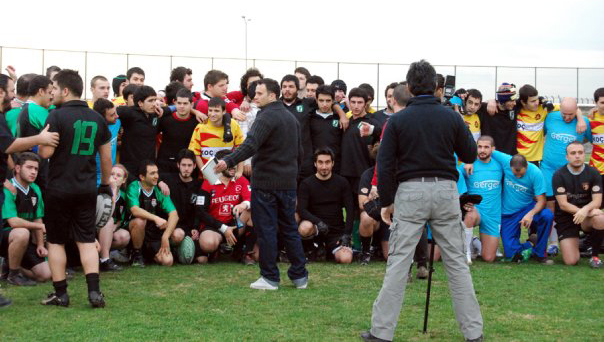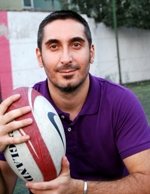
Nick “Bones” Attewell caught up with Oytun Çölok, the executive editor of the first and only Turkish rugby magazine, RugbyTurkiye.net. A late-comer to rugby, Çölok‘s made up for lost time quickly. Having played out a brief career, he’s ready for a new lease on the game as a referee and quest to build Rugby In Turkey. His refereeing resume already includes work alongside top class internationals and most recently he became an IRB Level 1 certified coach.
ISTANBUL, TURKEY – Usually when you talk rugby in Turkey, ironically it’s like the old expression about turkeys and the holidays – “… turkeys don’t vote for Christmas.” Yet, along the Bosporus the mood is all optimism. We witnessed that first-hand when we caught up with Turkish rugby revolutionary Oytun Çölok.
– When you meet someone who’s unaware rugby is played in Turkey, how do you describe the history of the sport there? How long has it been played?
Although rugby is a little-known sport in Turkey, it has been played since the 1940s. Prior to that, foreign teams, including ANZAC regiments, played on Ottoman soil during World War I. From 1945 to 1947, rugby grew quickly in Turkey. Famous sports clubs like Galatasaray, Fenerbahçe, Haydarpasa Lisesi among others played in a domestic league. In 1947, Fenerbahçe beat Galatasaray in front of 18,000 fans.
Unfortunately, lack of contact with other rugby nations meant Turkish rugby entered a period of hibernation until the establishment of Istanbul Ottomans RFC in 1999. Things started back up on a very relaxed, social level, with lots of western expats playing. Then national bodies began to accept rugby, first as part of a confederation of minor sports including baseball, softball and American football.
Last year, partly thanks to the inclusion of sevens as an Olympic sport, an independent Turkish Rugby Federation was formed. Around this time an Irishman, Niall Doherty (see below), became Turkey’s Director of Rugby. What was a loose collection of 13 clubs across Turkey came together and formed a domestic league. Most players are native Turks, and the national university in Ankara, METU, are current champions.
At last year’s final, French Top 14 referee Franck Maciello was in charge and I was an assistant referee along with another local, Güven Tasoglu. Fira-AER president Jean-Claude Baque was an honored guest at the match and came away impressed with the level of play. He pledged to help Turkey become Fira members, and after a strong international debut, our membership request was approved in July.
– Welcome to the international rugby fraternity! Turkey’s debut seemed to be a few years in the making. Can you tell us some of the challenges that went into organizing the team and matches? Did you encounter any opposition from Turkish sporting bodies?
Thank you. As I mentioned, rugby started to develop rapidly after the arrival of Niall. A shortage of specialized equipment has been our biggest obstacle. It has been surprising and exhilarating to see things change for the better so quickly though. We’ve shifted to a more professional mindset and clubs must now comply with player regulations, including registration and safety guidelines.
The other obstacle has been a shortage of qualified coaches and referees. An IRB course visited last year and greatly helped our pool of qualified refs. Sponsorship still proves difficult for clubs and the national team, Turkish companies perceive rugby as an unknown. My magazine is doing its best to change that.
In terms of organization we haven’t encountered problems booking grounds. Turkish sporting bodies have largely cooperated. And again Fira-AER have been particularly helpful, our membership was approved unanimously by their council.
– We’ve mentioned your coach, Niall Doherty. He has an interesting background as an Irishman who previously worked with Greece. Can you tell us how he came to be linked with Turkey?
Honestly, it’s a bit of a mystery how Niall arrived. But I would say thank God he came! This is one of the best and most judicious appointments by our federation. As far as I know, when Niall started to coach Greece they were in formative stages so he was familiar with our situation. It is comparatively easy to coach teams in countries where rugby is on the sporting map, but if you are in the introductory stages, you have to be not only a patient coach but a very good salesman. This is particularly true in Turkey where we have a lot of bureaucracy.
– Turkey’s debut came last spring in the form of exhibitions against Slovakia and Estonia. Both were easy victories. Did this come as a surprise, or was there a feeling after the Turkish team assembled that they were a strong group?
In Turkey we didn’t really know what to expect. Some of the overseas players Niall selected were unknown to us. But one thing we knew was that they would be in good physical shape, they go through a tough conditioning regimen when assembled for national team duty. They did have some prior experience playing together in sevens tournaments in Istanbul, but Slovakia and the Estonia had been playing fifteens together longer.
Their success was a source of joy for us and they showed Turkey’s intent in rugby. This is still the beginning, I know we are going to develop quickly.
Part II with Nick and Oytun tomorrow… In the meantime, please feel free to comment below, look for and “Like” our Facebook Rugby Wrap Up Page and follow us on Twitter @RugbyWrapUp, @JunoirBlaber, @Declan Yeats and @Mathew Drew Turner, respectively.
Thank you.


